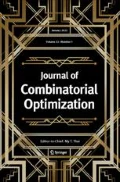Abstract
We study the performances of Nash equilibria in isolation games, a class of competitive location games recently introduced in Zhao et al. (Proc. of the 19th International Symposium on Algorithms and Computation (ISAAC), pp. 148–159, 2008). For all the cases in which the existence of Nash equilibria has been shown, we give tight or asymptotically tight bounds on the prices of anarchy and stability under the two classical social functions mostly investigated in the scientific literature, namely, the minimum utility per player and the sum of the players’ utilities. Moreover, we prove that the convergence to Nash equilibria is not guaranteed in some of the not yet analyzed cases.
Similar content being viewed by others
References
Ahn HK, Cheng SW, Cheong O, Golin MJ, Oostrum R (2004) Competitive facility location: the Voronoi game. Theor Comput Sci 310(1–3):457–467
Anshelevich E, Dasgupta A, Tardos E, Wexler T (2003) Near-optimal network design with selfish agents. In: Proc of the 35th annual ACM symposium on theory of computing (STOC). ACM, New York, pp 511–520
Cheong O, Har-Peled S, Linial N, Matousek J (2004) The one-round Voronoi game. Discrete Comput Geom 31:125–138
Dürr C, Thang NK (2007) Nash equilibria in Voronoi games on graphs. In: Proc of the 15th annual European symposium on algorithms (ESA). LNCS, vol 4698. Springer, Berlin, pp 17–28
Eaton BC, Lipsey RG (1975) The principle of minimum differentiation reconsidered: Some new developments in the theory of spatial competition. Rev Econ Stud 42(129):27–49
Eiselt HA, Laporte G, Thisse JF (1993) Competitive location models: A framework and bibliography. Transp Sci 27(1):44–54
Fekete SP, Meijer H (2005) The one-round Voronoi game replayed. Comput Geom Theory Appl 30:81–94
Hotelling H (1929) Stability in competition. Comput Geom Theory Appl 39(153):41–57
Jain AK, Murty MN, Flynn PJ (1999) Data clustering: a review. ACM Comput Surv 31(3)
Koutsoupias E, Papadimitriou CH (1999) Worst-case equilibria. In: Proc of the 16th international symposium on theoretical aspects of computer science (STACS). LNCS, vol 1653. Springer, Berlin, pp 404–413
Mavronicolas M, Monien B, Papadopoulou VG, Schoppmann F (2008) Voronoi games on cycle graphs. In: Proc. of the 33rd international symposium on mathematical foundations of computer science (MFCS). LNCS, vol 5162. Springer, Berlin, pp 503–514
Nash J (1950) Equilibrium points in n-person games. In: Proc of the national academy of sciences, vol 36, pp 48–49
Teng SH (1999) Low energy and mutually distant sampling. J Algorithms 30(1):42–67
Zhao Y, Chen W, Teng SH (2008) The isolation game: A game of distances. In: Proc of the 19th international symposium on algorithms and computation (ISAAC). LNCS, vol 5369. Springer, Berlin, pp 148–159
Author information
Authors and Affiliations
Corresponding author
Rights and permissions
About this article
Cite this article
Bilò, V., Flammini, M., Monaco, G. et al. On the performances of Nash equilibria in isolation games. J Comb Optim 22, 378–391 (2011). https://doi.org/10.1007/s10878-010-9300-3
Published:
Issue Date:
DOI: https://doi.org/10.1007/s10878-010-9300-3




